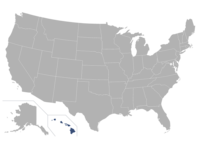Former Hawaii Executives Plead Guilty To Sending Illegal Donations To US Sen. Susan Collins

NFTS Logo
WASHINGTON — Two former executives of a Hawaii-based defense contractor recently pleaded guilty to taking part in a scheme to funnel tens of thousands of dollars in illegal campaign contributions to U.S. Sen. Susan Collins during her 2020 bid for reelection.
Clifford Chen and Lawrence Lum Kee both worked for Navatek, an engineering firm that was doing research and development for the Navy and had satellite offices located in Collins’ home state of Maine.
Chen and Lum Kee were indicted in August 2021 by a federal grand jury along with their boss, Martin Kao, who was then the president and CEO of the company.
According to the indictment, which was unsealed in February 2022 in U.S. District Court in Washington, D.C., Kao, Chen and Lum Kee used company funds to donate large sums of money to Collins’ reelection efforts, including through a shell company meant to mask their identity when sending $150,000 to a pro-Collins super PAC.
They also recruited family members to donate thousands of dollars directly to Collins’ campaign after they themselves reached their contributions limits, which at the time was $5,600.
Many of the details contained in the indictment followed along closely with those disclosed by Civil Beat during a 2019 investigation into Navatek employees’ campaign contributions to Collins.
In total, Kao, Chen, Lum Kee and their relatives donated more than $61,000 to Collins’ campaign.
Many of the contributions came shortly after Collins, a Republican who sits on the Appropriations Committee, boasted in a press release of securing funding for an $8 million contract that Navatek won from the Office of Naval Research.
The original release included photos of Collins posing with Kao at Navatek’s offices in Portland, Maine, but those pictures appear to have been removed from her official website.
Under federal law, it is illegal for government contractors to donate directly to candidates.
It’s also illegal to make “straw” donations, which means to give money to others to donate on one’s behalf.
Chen and Lum Kee each pleaded guilty on April 24 to making conduit contributions in violation of federal law.
According to their plea agreements, the offense carries a maximum penalty of up to a year in prison, but prosecutors are recommending a range of zero to six months plus a fine that could be anywhere from $2,000 to $20,000.
Lum Kee’s attorney, Pleasant Brodnax, declined to comment on the case when contacted by Civil Beat. Neither Chen or Kao’s defense lawyers responded to requests for comment.
Annie Clark, a spokesperson for Collins’ campaign, provided a written statement in response to the latest plea deal.
Clark said there were no allegations of wrongdoing on the part of the campaign and that it “cooperated fully” with the FBI during its investigation.
“The campaign divested itself of all the contributions associated with Mr. Kao and his associates,” she added. “Both the campaign’s website and donor forms stated clearly the very basic law that donors cannot make a contribution in another person’s name.”
Reports filed with the Federal Election Commission show that about a month after Kao, Chen and Lum Kee were indicted, Collins’ campaign donated $61,600 to an organization described in the documents as “MSAD 33,” which is a regional school district in Maine.
The money was earmarked as a donation to help the district rebuild an elementary school that was destroyed by fire.
Both Chen and Lum Kee are scheduled to be sentenced in August.
Kao, meanwhile, faces his own set of legal challenges.
In September, Kao pleaded guilty in two separate criminal cases, one involving the illegal campaign contributions and another in which he bilked millions of dollars from the Paycheck Protection Program, which was meant to provide federal aid to small businesses that were struggling during the height of the Covid-19 pandemic.
Kao was scheduled to be sentenced in the PPP case in March, but in January was indicted by federal prosecutors in Hawaii on a new set of bank fraud charges involving allegations that he falsified investment records to show he had more money than he actually did so he could obtain a $3 million loan to purchase a luxury home in Kahala.
A trial in that case is scheduled for November, and if the government wins it will seek to seize Kao’s home, which, property records show, he purchased in 2020 for $4.5 million.
Kao has pleaded not guilty in the case.
Kao is not scheduled to be sentenced in the PPP fraud matter until September. His attorneys have asked that his sentencing in the illegal campaign contributions case be delayed until then.
Kao, Chen and Lum Kee are no longer associated with Navatek. The company is under new ownership and since been renamed and rebranded as PacMar Technologies.








